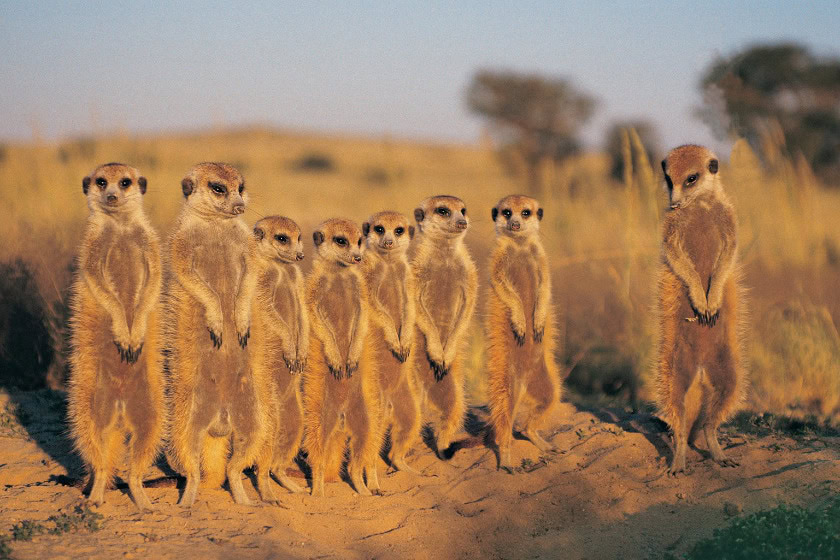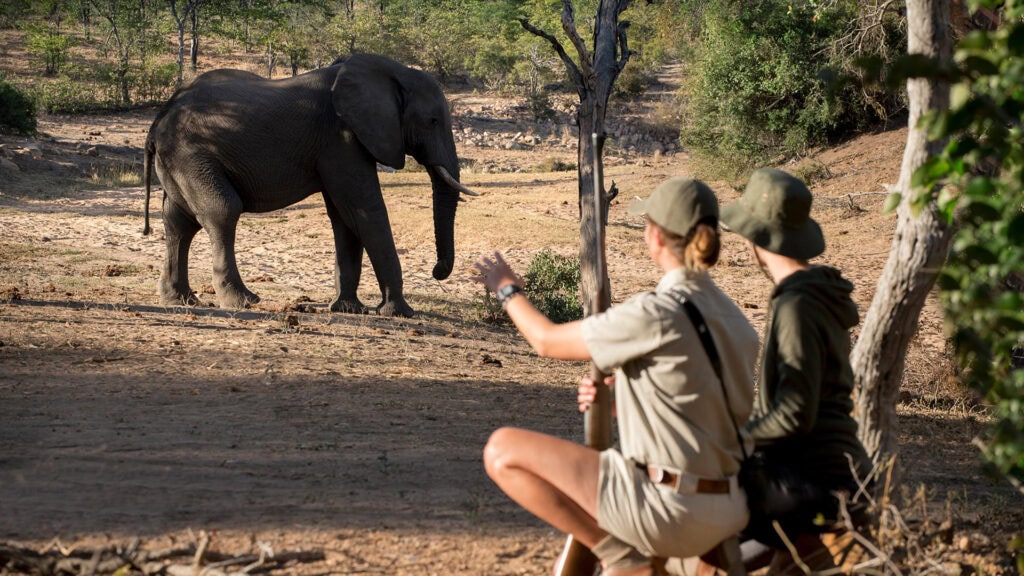So, you’ve settled on southern Africa as your ideal safari destination, but you can’t choose between two of the world’s most famous wildlife havens: South Africa and Botswana. One is home to Kruger National Park, a game reserve that’s bigger than some countries, and the other boasts the Okavango Delta, a UNESCO World Heritage Site frequented by the world’s best wildlife filmmakers.
That’s just the tip of the iceberg. When it comes to South Africa and Botswana, you’re spoilt for choice with the sheer spread of safari experiences. So, if you’re looking for an answer to which is the better safari destination, there’s no clear answer.
We’ve built thousands of bespoke itineraries for travellers over the years, and this is where it all starts. Ideally, we recommend spending some time in both countries to make the most of your time in southern Africa. However, if you really have to choose just one, you’ll need to be equipped with everything you need to know about safaris in South Africa and Botswana, how they differ, and the types of experiences you can expect on either side of the border. Let’s dive straight into it and help you choose your next African safari destination.
Quick Comparison: South Africa vs Botswana

| South Africa | Bostswana | |
| Top Safari Destinations | Kruger National Park, iSimangaliso Wetland Park, Sabi Sands Game Reserve, Madikwe Game Reserve, Timbavati Private Nature Reserve | Okavango Delta, Moremi Game Reserve, Chobe National Park, Central Kalahari Game Reserve, Makgadikgadi Pans National Park |
| Peak Seasons | May-November | July-October |
| Activity Highlights | Big Five Safaris, Walking Safaris and Animal Tracking, Whale Watching, Marine Safaris, Photographic Safaris, Game Drives, Horseback Riding Safaris, Birding, Beach Days, Wine Tasting | Big Five Safaris (although rhinos are rare), Chobe River Boat Cruises, Walking Safaris, Mokoro (Traditional Canoe) Safaris, Stargazing, Desert Safaris, Horseback Riding Safaris, Birding |
| Iconic Wildlife | Lions, Leopards, Buffaloes, Elephants, Rhinos, Cheetahs, Hippos, Giraffes, African Wild Dogs, Whale Sharks, Great White Sharks, Whales, Penguins, Spotted Hyenas, Zebras | Black-maned Kalahari lions, Leopards, Buffaloes, Elephants, , Cheetahs, Hippos, Giraffes, African Wild Dogs, Spotted Hyenas, Zebras, Nile Crocodiles, Meerkats, Sitatunga Antelopes |
Climate
| South Africa | Botswana | |
| Rainy Season | Kruger and Surrounds: October to April Cape Town: May to September | November to March |
| Dry Season | Kruger and Surrounds: May to September Cape Town: October to April | April to October |
| Best Time for Game Viewing | Dry season | Dry Season |
When it comes to climate, weather patterns are quite similar in South Africa and Botswana. The weather is predictable, especially when trying to plan around the rainy season – but why is that important? Well, during the dry winter months, there’s less vegetation around, making it much easier to spot wildlife in the bush. Furthermore, animals tend to congregate around water sources, so you’re virtually guaranteed to see game at waterholes and rivers.
Nowhere is this more spectacular than in Botswana’s Okavango Delta. During the dry season, there’s little to no rain, but the delta transforms into a vast wetland as water emerges from far north in Angola. This is the perfect time for mokoro safaris in Botswana, an adventure that will take you along the rivers in a traditional dugout canoe.
Keep in mind that South Africa’s southern regions have dry summers and wet winters instead. The best time to visit Cape Town, for example, is during the peak of summer in December and January. However, northern wilderness areas like Kruger National Park will be hot, wet, and humid during the same period of time, making combination trips difficult. If you do plan to pair a South African safari with a visit to the Western Cape, consider visiting during “cusp” seasons in autumn and spring – our recommended month is September.
Wildlife
| South Africa | Botswana | |
| Unique Wildlife | Mountain Zebras, Southern Right Whales, Great White Sharks, Cape Fur Seals, Pangolins, Blue Wildebeests, Gemsbok | African Wild Dogs, Sitatunga Antelopes, Puku Antelopes, Red Lechwe Antelopes |
| Notable Birds | Over 840 Bird Species Including: Bearded Vulture, Mangrove Kingfisher, African Penguin, Knysna Turaco, Cape Sugarbird, African Fish Eagle, Martial Eagle, Secretary Bird | 615 Bird Species Including: Wattled Crane, African Skimmer, Rüppell’s Parrot, Pel’s Fishing Owl, Grey-Crowned Crane, Caspian Plover, Ovambo Sparrowhawk, African Fish Eagle, Martial Eagle, Secretary Bird |
South Africa and Botswana each offer extraordinary wildlife experiences, yet the nature of their ecosystems and animal populations provides visitors with contrasting adventures. Down south, Kruger National Park is world-renowned for its vast landscapes and dense concentrations of wildlife, including the famed Big Five. Researchers estimate that there are more species of large mammals here than anywhere else in Africa – and plenty of them. In fact, there are over 1,500 lions here, as well as over 30,000 elephants and over 1,000 leopards.
In contrast, Botswana’s Okavango Delta presents a more remote and exclusive experience. Known for its seasonal flooding, the delta transforms into a lush oasis during the dry season, attracting large herds of elephants, buffaloes, and various predators. In fact, lions in the delta have learnt to brave the crocodile- and hippo-infested waterways to get to their prey. Botswana’s Chobe National Park is another prime location for viewing wildlife, particularly its massive elephant populations that crisscross their way across the Chobe River. The water also attracts huge flocks of migrating birds.
Botswana’s unique water-based safaris and low-impact tourism policies emphasise preservation and seclusion, creating a more intimate connection with nature. South Africa’s trump card is its long coastline, which makes it a remarkable ocean safari destination. In places like iSimangaliso Wetland Park, you can snorkel with whale sharks and go on a bush safari on the same day!
Best Safari Destinations

If You Want to See the Big Five
There’s no clear winner between South Africa and Botswana here. Both regions are home to Big Five game reserves, so think about some of the other kinds of animals you’d like to see. However, both black and white rhinos are very rare in Botswana, whereas South Africa has more robust populations of each species.
If You Want to See Lots of Elephants
As mentioned, Kruger National Park is home to over 30,000 elephants. You might think that’s a lot of pachyderms, but some sources estimate that there are over 100,000 in Botswana’s Chobe National Park alone. The healthy population means that this is one of the only places where lions actively hunt elephants!
If You Want to See Big Cats
You can see lions, leopards, and cheetahs in both South Africa and Botswana. However, when it comes to leopards, it’s hard to beat Kruger National Park and Sabi Sand Game Reserve, in particular. This collection of private game reserves borders the western side of Kruger, and many consider it one of the best places in southern Africa to see these big cats in the wild.
In Botswana’s Central Kalahari Game Reserve, all three big cats can be spotted. The black-maned Kalahari lion is a particularly spectacular sighting!
If You Want to See Birds
The Okavango Delta is a spectacular destination for birdwatching safaris in Botswana. Seasonal floods attract immense numbers of birds from as far afield as Siberia, and the abundance of local species like eagles, vultures, and colourful bee-eaters makes it a bird photographer’s dream and one of the best places for birding in Africa. A bit further south, flamingos and other waders fill the brackish waters of the magical Makgadikgadi Pans.
If You Want to See Marine Life
South Africa is one of the world’s premier whale-watching destinations. Each year, countless southern right whales and humpback whales migrate along the southern coast, making their way northward to their breeding grounds. If you’re brave enough, you can also go shark cage diving with great white sharks in the Western Cape or go scuba diving with whale sharks in iSimangaliso Wetland Park.
Activities

Going on safari is all about wildlife, but you can combine your game viewing with plenty of other exciting activities. In some cases, you can even enjoy a safari from above.
| South Africa | Botswana | Both Regions | |
| Activities | Food and Wine Tours, Malaria-Free Safaris, Luxury Rail Travel, Marine Safaris, Shark Cage Diving, Diving, Beach Trips | Mokoro (Traditional Canoe) Safaris, Mobile Camping Safaris, Zebra Migration Safaris, Cultural Tours | Big Five Safaris (rhinos are difficult to see in Botswana), Birdwatching Safaris, Horseback Riding Safaris, Desert Safaris, Photographic Safaris, Sustainable Safaris, Walking Safaris, Wellness Safaris |
Safety
- Southern Africa is generally safe for tourists, particularly in well-established safari destinations like South Africa and Botswana. However, it is always advisable to follow local guidelines and travel advisories.
- Safari lodges and parks have stringent safety protocols in place to ensure the safety of guests, including guided game drives and secure accommodations.

Cuisine
| South Africa | Botswana |
| South Africa’s diverse cultural history is reflected in its culinary scene, influenced by cultures such as Malaysia, Indonesia, India, and Portugal. Famous dishes include biltong (dried cured meat), boerewors (sausage), and bobotie (a spiced meat dish with an egg topping). The braai (grilling meat over coals) is a central part of South African cuisine, offering both a meal and a social gathering. Safari lodges provide a variety of gourmet meals, often incorporating local flavours and ingredients. | Botswana’s national dish is seswaa, a boiled and pounded meat dish (usually beef or goat) served with pap (maize porridge) or samp (pounded corn kernels). Botswana has its own version of biltong, called segwapa. Some indigenous San people still rely on hunting and gathering, using natural resources like ostrich eggs, caterpillars, nuts, tsamma melons, num num (wild plums), and Kalahari truffles. Safari lodges provide a range of gourmet meals, often incorporating local flavours and ingredients |
Ready to Make Your Decision?
Both South Africa and Botswana provide exceptional safari experiences, but the right choice depends on what you’re after. If you want to combine your safari with a beach holiday or are interested in exploring wine routes and well-awarded restaurants, South Africa is a great choice. You can explore vast game reserves like Kruger National Park and even add a city stopover or a coastal holiday to your safari.
However, if you’re drawn to a more exclusive and remote experience, Botswana might be more suitable. The Okavango Delta offers unique water-based safaris, and Botswana’s emphasis on low-impact tourism ensures that you’ll encounter fewer crowds and enjoy a deeper connection with nature.
Whichever destination you choose, you’ll come to appreciate why both South Africa and Botswana are among the best safari spots in Africa. When you’re ready to plan your adventure, speak to one of our expert safari travel planners, and we’ll help create your perfect itinerary.